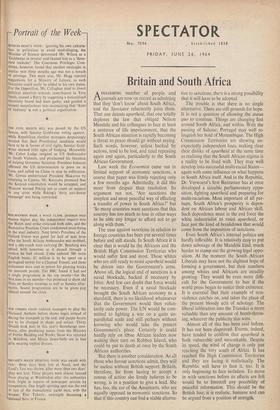Britain and South Africa
ADISARMING number of people and journals are now on record as admitting that they 'don't know' about South Africa, and the Spectator reluctantly joins them. That one detests apartheid, that one totally deplores the law that obliged Nelson Mandela and his colleagues to face at least a sentence of life imprisonment, that the South African situation is rapidly becoming a threat to peace should go without saying. Such words, however, unless backed by actions, tend to be lost, and need repeating again and again, particularly to the South African Government.
Last week the Economist came out in limited support of economic sanctions, a course that paper was firmly rejecting only a few months ago. Admittedly, it did this more from despair than resolution. Its argument ran not, 'Are sanctions the simplest and most peaceful way of effecting a transfer of power in South Africa?' but `So many countries want sanctions that this country has too much to lose in other ways to be able any longer to afford not to go along with them.'
The case against sanctions in relation to foreign countries has been put several times before and still stands. In South Africa it is clear that it would be the Africans and the British High Commission Territories who would suffer first and most. Those whites who are still ready to resist apartheid would be driven into the Government's arms. Above all, the logical end of sanctions is a naval blockade, backed if necessary by fo'rce. And few can doubt that force would be necessary. Even if a naval blockade brought the South African economy to a standstill, there is no likelihood whatsoever that the Government would then volun- tarily cede power. The UN would be com- mitted to fighting a war on a quite un- paralleled scale and still perhaps without knowing who would take the present Government's place. Certainly it could hardly rely on those African leaders now waiting their turn on Robben Island, who could be put to death at once by the South African authorities.
But there is another consideration. As all those who favour sanctions admit, they will be useless without British support. Britain, therefore, far from having to accept a course of action she firmly believes to be wrong, is in a position to give a lead. She has, too, the ear of the Americans, who are equally opposed to economic sanctions. So that if this country can find a viable alterna- tive to sanctions, there is a strong possibility that it will have to be adopted.
The trouble is that there is no single alternative. There are still grounds for hope.
It is not a question of allowing the status quo to continue. Things are changing fast around South Africa, and within. With the passing of Salazar, Portugal may well re- linquish her hold of Mozambique. The High Commission Territories are showing un- expectedly independent lines, making clear their dislike of apartheid at the same time as realising that the South African regime is a reality to be lived with. They may well develop into successful multi-racial States— again with some influence on what happens in South Africa itself. And in the Republic, Dr. Verwoerd's first Bantustan has at once developed a sizeable parliamentary oppo- sition, fighting apartheid and preparing for multi-racialism. Most important of all per- haps, South Africa's prosperity is depen- dent on African labour and African skill.
Such dependence must in the end force the white industrialist to resist apartheid, or face just the kind of breakdown that would come from the imposition of sanctions.
Even South Africa's internal politics are hardly inflexible. It is relatively easy to put down sabotage of the Mandela kind, much harder to stamp out the growing legal oppo- sition. At the moment the 'South- African Liberals may have not the slightest hope of forming a government, but their numbers among whites and Africans are steadily growing. They would be even more diffi- cult for the Government to ban if the world press began to notice their existence.
It is essential that their example of non- violence catches on, and takes the place of the present bloody acts of sabotage. The liberal infiltration into the Transkei is more valuable than any amount of bomb-throw- ing, whatever the publicity this wins.
Almost all of this has been said before. It has not been disproved. Events, indeed, have tended to confirm that apartheid is both vulnerable and unworkable. Despite its speed, the wind of change is only just reaching the very south of Africa. It has reached the High Commission Territories and they are facing it realistically. The Republic will have to face it, too. It is only beginning to face isolation. To move in with sanctions before its effects. are felt would be to forestall any possibility of peaCeful reformation. This should be the British line; it is realistic, humane and can be argued from a position of strength.


































 Previous page
Previous page